Pyrmont’s Doltone House played host to a gathering of Australia’s marketing elite at Jones Bay Wharf for a day of valuable insights and tools at the ADMA Global Forum.
The day’s proceedings were led by Nine News’ television and sports report, James Bracey. Bracey’s role was fitting, given the event’s theme, “elevate your marketing game.”
Check out Mediaweek’s recap of the day’s highlights below.
Opening Address
ADMA’s CEO, Andrea Martens, outlined the context and purpose behind the theme of “elevation.”
Reflecting on what elevation means to her, Martens shared, “A trifecta of instances comes to mind. The first, the times when my own game has been on point, but my team haven’t quite been along for the ride. The second, where the team embraces ideas and initiatives that might well clash with my own, sometimes more conservatively in combinations.
“And then the third… when the team and I were aligned, but there was a misfit between our collective vision and the business’s support or investment. To me personally, ‘elevate’ materialises when all elements are aligned.”
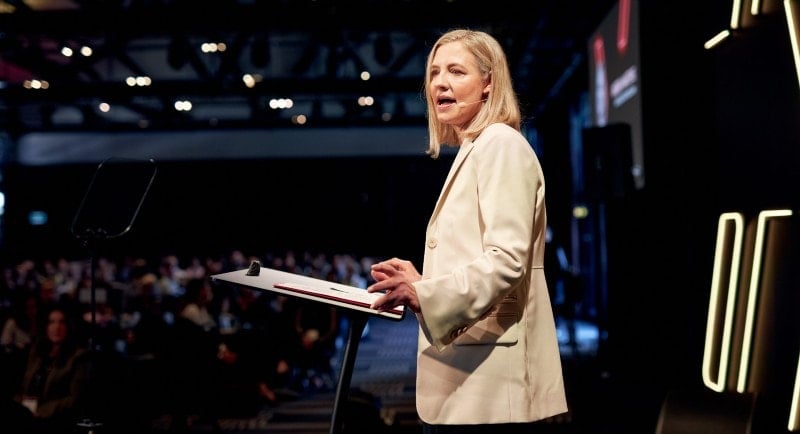
At the closing of her address, Martens urged the audience, “Don’t just aim to elevate your career. Aim to elevate your teams, your businesses, your brands, your industry and the very definition of what marketing can be.”
“AI and The Attention Economy”
AI specialist and CEO of Transhuman, Amanda Johnstone, flew in from LA to prompt the audience to think about the consumer’s psychophysiological state as an asset for marketers in the near future, as the digital landscape shifts from “an internet of things” to an “internet of bodies,” driven by technologies like emotion AI.
In this instance, internet of bodies refers to the body being used as a data source, with devices that can be warn, implanted, tattooed, adhered, or ingested. They can also be powered by external devices such as cameras, or voice recorders. According to Johnstone, “The new future involves understanding the psychophysiological state of the body to pinpoint and target consumers.”
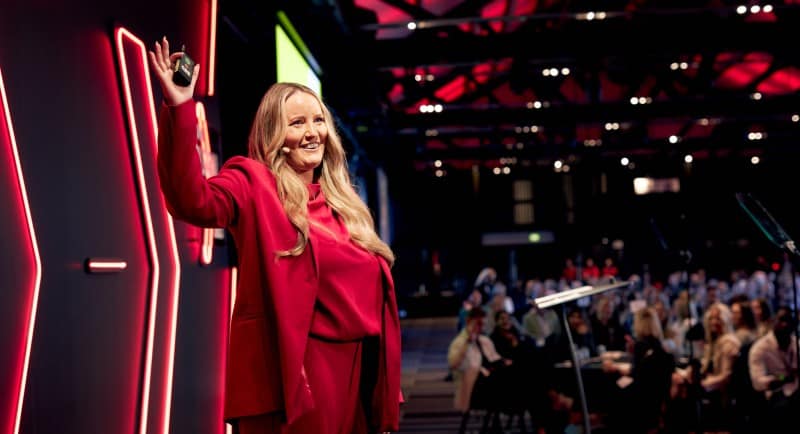
She offered the example, “Disney had a campaign, I think it was for Coca-Cola, and they were able to do temperature recognition of someone walking towards the screen. They were able to show them either iced Coca-Cola or regular Coca-Cola depending on how hot [temperature] that person was.”
Addressing transhumanism’s marketing potential, Johnstone emphasised: “Understanding that this technology exists is going to be the first step in showing you what is going to be deployed in the future, and how you can think about using that when you’re rolling out future campaigns.”
See Also: Amanda Johnstone: Why Australia is ‘ready’ to hear about AI at ADMA
Scott Galloway: “Overhyped vs Underhyped”
NYU Stern’s marketing professor, Scott Galloway, dialled in live from Nantucket for a presentation that captured his trademark blend of wit, outspokenness, and forward thinking. Galloway gave an unfiltered evaluation of today’s overhyped trends, subjects, and products that have an unfair share of our attention, along with some underhyped prospects awaiting marketers and the general public.
On the AI front, Galloway dismissed fear-mongering speculation as an unproductive conversation, asserting, “AI won’t take your job, people who understand AI will.” He labelled language as the new programming frontier, stating, “English has become the new programming language,” as prompt engineering surfaces as an increasingly valuable skill. Galloway anticipated the transformative aspect of AI for mental well-being, especially for young people who feel comfortable speaking to chatbots: “This is going to be one of the more value-added components of technology over the next 10 years.”
Sharing his thoughts on underhyped opportunities, Galloway named “democratised banking” and the potential of supersonic travel. He commented, “It’s a game changer when people can get from New York to London in 3 and a half hours as opposed to 6 and a half or 7. It opens it up for weekends as opposed to just a week and I think it’s going to set up a boom in high-end travel.”
In terms of overhype, Galloway critiqued wearable tech, specifically headsets like Oculus and Apple’s upcoming Mixed Reality Headset, predicting it to be “one of Apple’s biggest product failures.” He also gave space tourism and democratised investing via platforms like Robinhood a proverbial expiry date.
“You Can’t Convert Demand That Doesn’t Exist.”
Jess Hatzis, co-founder and CMO of a prominent beauty brand, Frank Body, shared case studies of successful brand marketing campaigns undertaken by innovative small businesses. Her aim was to shed light on the significance of brand marketing in a landscape where marketers have arguably grown risk-averse, favouring the seemingly safer path of performance marketing, giving rise to what she termed a “short-term mindset”.
Hatzis mentioned, “What we all have in common as marketers, no matter what type of business we come from, is that tension we feel between product marketing and brand marketing.”
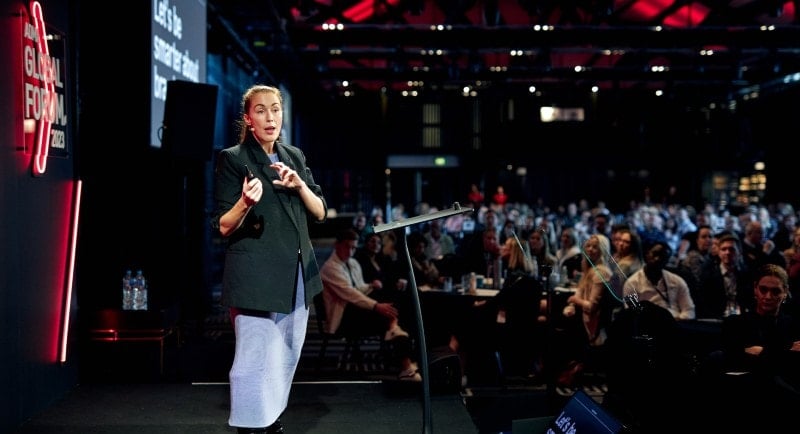
In a bid to “inject a small business mindset” into the audience, Hatzis presented the following examples of “scrappy and interesting” thinking (among others), that capture how brand marketing can secure future demand by forging an emotional connection with customers.
1. “No worries if not” by shaving and body care brand, Billie
2. “All Mothers Work” by baby product company, The Memo
3. “You can’t ban this breast!” by inclusive underwear label, Nala
Presenting stats like how “88% of consumers say authenticity is important when deciding what brands they love can support” and how “71% of consumers buy from brands who share the same values as them” Hatzis summarised, “We achieve all of this through brand marketing. We execute and capture the sales through performance.”
See Also: Jess Hatzis: Why we should rethink how businesses measure ROI
“Tough Times Don’t Last, Tough Marketers Do.”
Alexander Meyer, best known in the Australian marketing industry as the former CMO of The Iconic, took to the stage for his presentation “Tough Times Don’t Last, Tough Marketers Do.”
Meyer shared seven key learnings from his career – from his time with Adidas, The Iconic in Sydney, as chief customer officer of The Bay in Canada. His next move will be as the CEO of Happy Socks in Amsterdam.
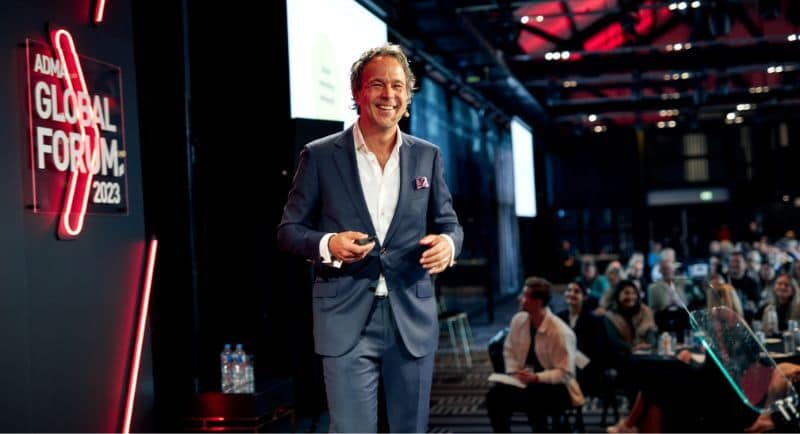
Following his talk, Meyer spoke with Mediaweek (for an upcoming feature) about the characteristics marketers should employ during a tough economy, his career highlights, and his exciting new role with Happy Socks.
In the conversation, Meyer said that he hoped that attendees reflected on his learning points, going back to basics and applying transparency in their work as it will make them resilient.
“It makes you tough when you can deal with difficult situations because you’re not tapping into what worked in the past. You’re tapping into principles of what to live by, and they can apply to any situation,” Meyer added.
“Developing 4Ds of Marketing Compliance”
Following a lunch and networking break, attendees convened for a panel moderated by Jo Bundy, CMO of the Commonwealth Bank of Australia, called “The Developing 4Ds of Marketing Compliance”.
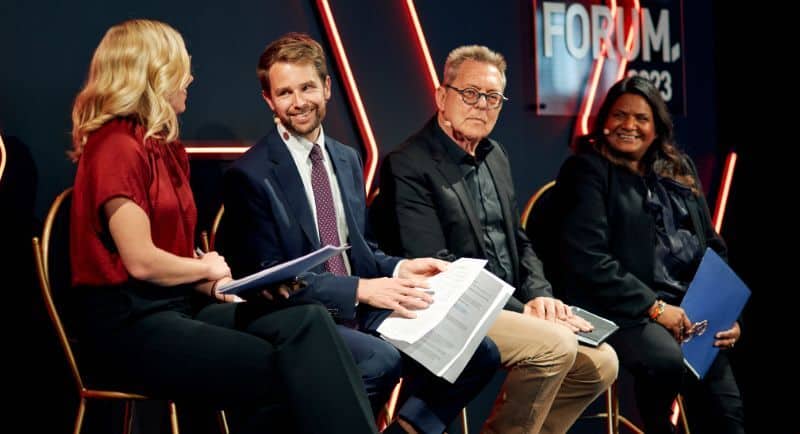
To start the conversation, Bundy shared that she asked ChatGPT if “regulation is sexy,” the AI replied: “Picture this, a world where your personal information is treated as sacred. And as in a secret garden, where every interaction, every transaction is conducted with the utmost respect for your boundaries. This, my friends, is the essence of privacy. And let me tell you, it’s downright sexy.”
She was joined on stage by ADMA’s Sarla Fernando, the director of regulatory and advocacy, Andrew Francis, the director of the digital platforms branch at ACCC, and Peter Leonard, principal and director of Data Synergies, as they each covered the four Ds – digital platforms, data privacy, dark patterns, and decision-making.
Melissa Hopkins on marketing lessons from a data breach
Melissa Hopkins, Seven West Media’s chief marketing and audience officer, took to the stage with Nadia Cameron to share the marketing lessons she learned as vice president of marketing CMO during the Optus data breach of 2022.
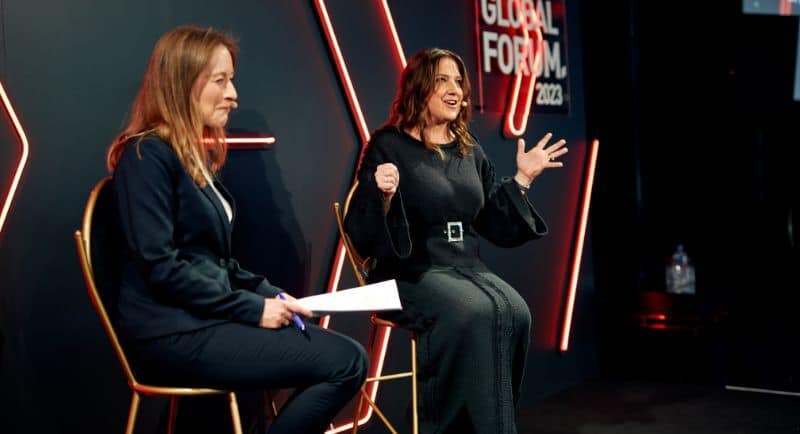
Hopkins said, “No one had prepared for this event. As a team and as an organisation, we had crisis management responses in place, and probably like any good organisation for things heavily linked to your business, like network outages, bushfires, and floods. We have prepared pre-approved copy around that; we had teams that we knew who to pull in and who were the core people to be involved in teams when crises certainly came together.
“As a marketing team, we have been quite nimble in how we responded. I think the more interesting thing with this was the gravitas, scale, and sensitivity of the situation. That meant we had to look at it with a different approach.”
See Also: Melissa Hopkins: The importance of learning from marketing challenges
Mark Ritson on brand and data
Rounding out the day was Mark Ritson, marketing professor and founder of Mini MBA, whose presentation, “Brand and data”, was an entertaining yet no-BS approach to how marketers should approach their work.
Ritson didn’t shy away from calling out critics (even himself), outdated marketing methods and philosophies, and even current trends – particularly AI.
Ritson also told audiences, “The consumer doesn’t give a fuck” when it comes to the narrative spun by marketers about a brand. His point to them was to get to and work from the reality of the consumer’s truth.

In an upcoming feature with Mediaweek, he explained: “The truth is in the consumer. So, the fact that consumer doesn’t give a fuck isn’t a licence for the marketer to educate them to give more of a fuck. Instead, it’s for the marketers to change their attitude.
“They’re trying to say too much, they’re overstating the importance of their brands, they’re trying to be too complicated.
“What they have to grasp is their brand is an average brand manager manages one brand, the average consumer is exposed to 2000 brands. Marketers need to get with the reality that the consumer truth is the truth they have to work from,” Ritson said.

